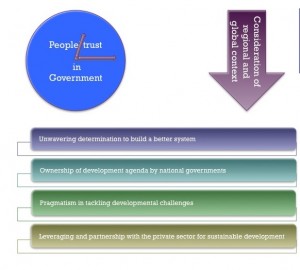A Few Keynotes from Mr. Kaberuka at the Post-Conflict Reconstruction Symposium
Reconstruction and development of post-conflict nations is a highly perplexing area for individual nations and the international community. According to a recent World Bank research, some countries can get caught in a fragility trap, slow growth, and the possibility of repeated cycles of violence (Andrimihaja et al, 2011). People encountered severe suffering as a result: population displacement, extra-judicial killings, destruction of infrastructure, and thus deeper poverty. A civil conflict costs the average developing country roughly 30 years of GDP growth (World Development Report 2011). It is therefore of fundamental importance for them to take active steps to prevent and avoid the recurrence of the conflicts.
According to Mr. Kaberuka, President of the African Development Bank, reconstruction and development of post-conflict nations involves building the economy, strengthening the capacity to govern and administer the country, and engaging with the international community for strategic support and development assistance. As he further added, there is unfortunately no magic manual for effective delivery of development outcomes. No size fits all; each conflict has to be examined for its own root causes in order to introduce effective intervention.
The causes of conflicts vary from one to another. The sources may be the absence of inclusive politics, maladministration of justice, fragile economic foundation, and inequitable distribution of wealth. The conflicts in Sudan and Serra Leone, for instance, were ingrained in the unequal distribution of the wealth the countries produce.
Mr. Kaberuka also noted that an understanding of the regional and international context will also offers an insight into the causes of a conflict and the nature of solution it calls for.
As he moved on to discuss the approach for reconstruction, Mr. Kaberuka offered a few keynotes to the participants:
- It is essential that domestic governments take full ownership of their development challenges. Toward this approach, the international community should give national governments sufficient space to drive their own development – a position that is humble but is quite often lost in the interaction and leverage between a donor and a donee country.
- With each country facing its own unique developmental challenges, national government should embrace a pragmatic approach in addressing them. This approach will entail a certain degree of mistakes being made along the way. Often, more effective home-grown approaches that could have produced desirable impact were not given due attention and consideration. Instead, attempts made by external actors to introduce development models that do not only yield the result for the national governments; on the contrary, it creates the unintended consequence of overreliance on the external actors by the national government in the push for the development. It is thus important for national governments to have and be given sufficient space to learn from their own efforts and failures, to innovate, and to try new developmental approaches.
- National governments must have the unwavering determination not just to rebuild, but to build a better system that avoid the same trap that had brought the countries into conflict in the first place. This may mean due attention needs to be given to improved governance system that embraces inclusive growth, enhanced structure for justice delivery, and enhanced cost-effectiveness to health care and education services for the population.
- In tackling their development challenges, national governments should not only leverage on financial assistance provided by the international community but also the strategic partnership that the private sector can offer. As the experiences of countries such as South Korea and Chile reveal, partnering with the private sector has turned out to be an effective approach that only assisted national governments to overcome their development constraints but it also helps these countries attain better sustainability on their paths to development.
In closing his keynote speech, Mr. Kaberuka warned that for a government system to be sustainable, the trust of the people in the system is crucial. That trust is unfortunately time-bound. People are usually anxious to see their government deliver results immediately. It is thus a challenge in itself or the government to strike an appropriate balance between its short-term and long-term development priorities.
